ISLAMABAD: The Organization of Islamic Cooperation’s (OIC) special envoy for Jammu and Kashmir can help resolve the decades-old conflict between South Asia’s two nuclear-armed neighbors – India and Pakistan – by projecting the Kashmir issue at various international forums and engaging all stakeholders in a meaningful dialogue to find a sustainable solution to the dispute, Kashmiri leaders and experts said on Sunday.
The OIC appointed Yousef Aldobeay of Saudi Arabia as its special envoy for Jammu and Kashmir, besides extending its support to the “legitimate right to self-determination” of the people of Jammu and Kashmir in accordance with United Nations resolutions.
Since 1947, Kashmir, a Muslim-majority region with 86,000 square miles of territory, remains disputed between India and Pakistan. Both countries claim it in full but only control parts of it. The two nations have also fought wars over the territory, but the dispute continues to linger on.
“We hope that the OIC special envoy [on Jammu and Kashmir] will support and highlight the legitimate and peaceful freedom struggle of Kashmiris at all international forums and expose Indian atrocities against them,” Mushaal Hussein Mullick, chairperson of the Peace and Culture Organization, told Arab News on Sunday.
She said that activists and freedom fighters in Kashmir had been asking Muslim countries for years to appoint a global envoy who could amplify their voice internationally, adding it was “encouraging to see it happen finally.”
“The position of the special envoy is very powerful because it has the backing of all Muslim countries … and it also goes beyond simple condemnations and news reports highlighting Indian violence against unarmed Kashmiris,” said Mullick, who is also the wife of Jammu and Kashmir Liberation Front (JKLF) leader Yasin Malik.
A final communique of the 14th summit of the OIC held in Makkah called for the establishment of a UN Commission of Inquiry to “investigate grave human rights violations [in Kashmir] and urged India to allow the Commission and other international organizations access to IoK [Indian occupied Kashmir],” Pakistan’s foreign office said on Saturday in a statement.
With 57 member states and a collective population of approximately 1.68 billion people, the OIC is the world’s second largest intergovernmental body after the United Nations.
“The OIC Summit gave a tremendous platform to Kashmir. We are lucky to have the world’s second largest multilateral organization take up the Kashmir conflict in such a robust way,” Ahmed Qureshi, a Kashmir affairs analyst, told Arab News.
Discussing the appointment of the OIC special envoy, he said that a difficult challenge awaited him as “he will be walking into one of the most difficult and protracted conflicts in the world today. But the good thing is that momentum exists and he can capitalize on it.”
Sardar Zaid Sajid, a Kashmiri human rights activist, also lauded the appointment, saying that the OIC focal person must try to resolve the conflict since it “poses a security threat to the whole world.”
“Both Pakistan and India are nuclear-armed countries and Kashmir conflict can trigger a deadly war between them anytime,” he warned, urging the special envoy to push the UN to hold plebiscite in Kashmir as per its resolutions.
OIC appoints special envoy to highlight Indian atrocities in Kashmir
OIC appoints special envoy to highlight Indian atrocities in Kashmir
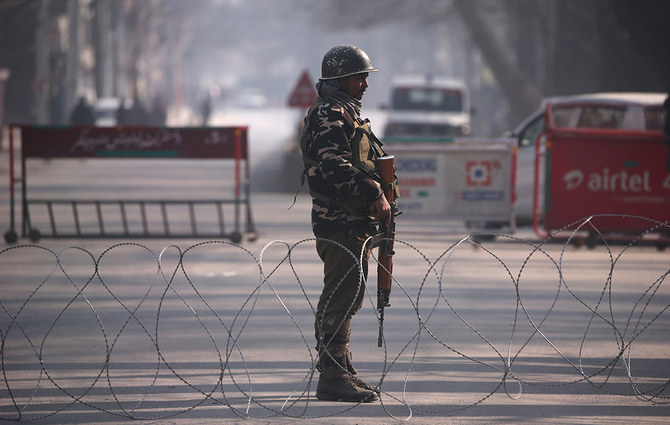
- Kashmiri leaders urge special envoy to push for UN plebiscite in their region
- Analysts say the envoy will be dealing with one of the most complex and challenging disputes
Gunmen kill two laborers from Punjab province in southwest Pakistan — official
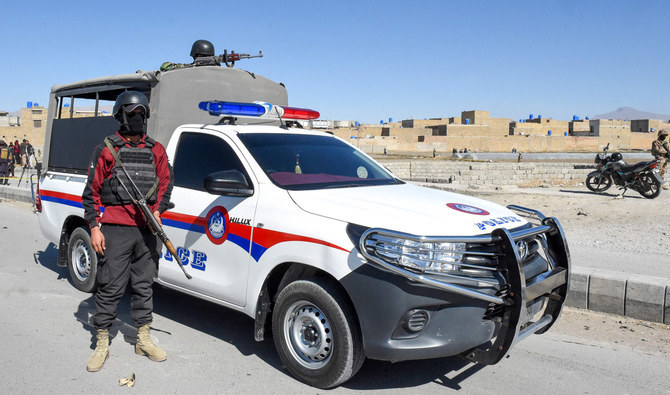
- The two laborers were working inside a garage in Tump area of Balochistan's Kech district when they came under attack
- No group immediately claimed responsibility, but Baloch separatists have previously targeted people from other provinces
ISLAMABAD: Unidentified gunmen on Sunday shot dead two laborers, who hailed from the eastern Punjab province, in the country's restive Balochistan province, a local official said.
The two laborers were working inside a garage in Tump area of Balochistan's Kech district when they came under fire by gunmen riding motorbikes, according to Saeed Umrani, commissioner of Makran Division where Kech is located.
No group immediately claimed responsibility for the attack, but Baloch separatists have previously targeted people from other provinces on suspicion of spying for state agencies.
"Both laborers, who were residents of the Punjab province, were killed on the spot," the official said.
Umrani said bodies of the deceased had been sent to their hometowns and the district administration was hunting for the perpetrators.
The attack came two weeks after armed men abducted nine passengers, who hailed from Punjab, from a bus and killed them near Balochistan's Noshki district.
The outlawed Balochistan Liberation Army claimed responsibility for the attack, saying it had information that plain-clothed spies were on the bus. The group offered no evidence to support its claim.
Balochistan has been the scene of a long-running insurgency by separatist militants who seek independence from the central government in Islamabad.
Although the government says it has quelled the insurgency, violence has continued to persist in the province.
Pakistan PM, Kuwaiti emir discuss transformation of bilateral ties into economic partnership
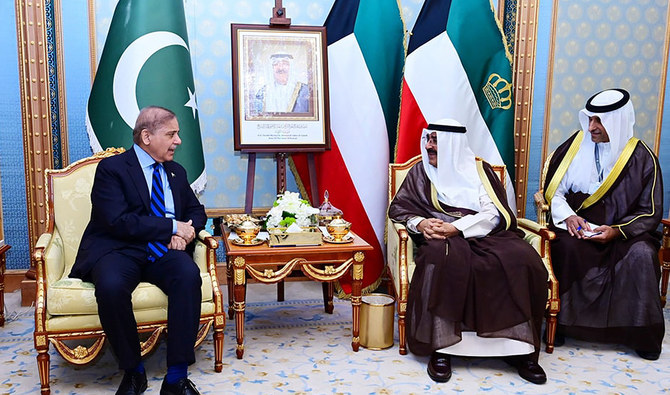
- The meeting came on the sidelines of a two-day World Economic Forum summit in Riyadh
- PM Shehbaz Sharif assured of efficient implementation of Pakistan-Kuwait deals signed in Nov.
ISLAMABAD: Pakistan Prime Minister Shehbaz Sharif on Sunday met with Emir of Kuwait Sheikh Mishal Al-Ahmad Al-Jaber Al-Sabah in Riyadh and discussed with him transformation of Pakistan-Kuwait ties into an economic partnership, Sharif’s office said.
The meeting came on the sidelines of a two-day World Economic Forum (WEF) summit on global collaboration, growth and energy on April 28-29.
PM Sharif thanked Sheikh Mishal for his congratulatory letter upon his re-election and congratulated him on assuming the role of the emir of Kuwait.
“The Prime Minister expressed his desire to work closely with His Highness to transform bilateral ties into a mutually beneficial economic partnership that would serve the best interests of the peoples of both countries,” Sharif’s office said in a statement.
The development came months after Pakistan and Kuwait signed several trade and investment agreements worth $10 billion during the visit of caretaker Pakistan PM Anwaar-ul-Haq Kakar to the Gulf country.
Besides these agreements, the two countries had signed three memorandums of understanding (MoUs) in the fields of culture, environment and sustainable development.
Pakistan’s army chief, General Asim Munir, had also accompanied the caretaker prime minister on the Kuwait visit in November, which was part of the Pakistani leadership’s ambitious plan to attract investment from the Middle East amid an economic slowdown at home.
“The Prime Minister assured the Kuwaiti leadership that these MoUs and agreements would be implemented in an efficient and timely manner,” the statement added.
“In addition to bilateral ties, the regional situation, particularly with regards to the crisis in Gaza, was also discussed.”
PM Sharif, IMF chief discuss Pakistan’s new loan program on WEF sidelines in Riyadh
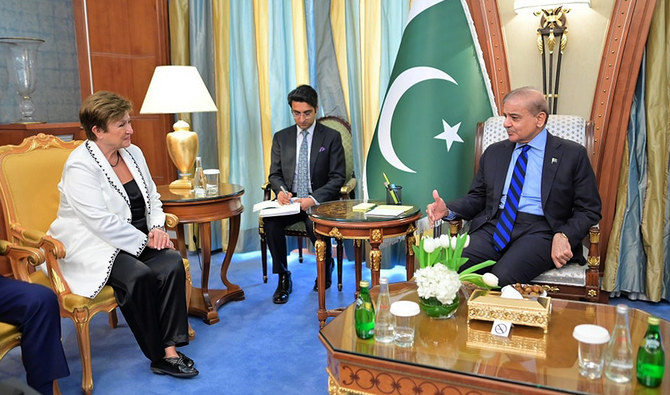
- Pakistan’s $3 billion IMF loan program, which helped Islamabad avert a default last year, is due to end this month
- Pakistan faces a chronic balance of payments crisis, with nearly $24 billion to repay in debt over next fiscal year
ISLAMABAD: Pakistan Prime Minister Shehbaz Sharif on Sunday met with International Monetary Fund (IMF) Managing Director Kristalina Georgieva in Riyadh, where the two figures discussed a new loan program for the cash-strapped South Asian country, Sharif’s office said.
The meeting between PM Sharif and the IMF managing director took place on the sidelines of a two-day World Economic Forum (WEF) summit on global collaboration, growth and energy in the Saudi capital on April 28-29.
Sharif thanked Georgieva for her support to Pakistan in securing a $3 billion IMF loan program last year that is due to expire this month. The IMF executive board is expected to meet on Monday to decide on the disbursement of the final tranche of $1.1 billion to Pakistan.
“MD IMF shared her institution’s perspective on the ongoing program with Pakistan, including the review process,” PM Sharif’s office said in a statement.
“Both sides also discussed Pakistan entering into another IMF program to ensure that the gains made in the past year are consolidated and its economic growth trajectory remains positive.”
Sharif informed the IMF chief that his government was fully committed to put Pakistan’s economy back on track, according to the statement.
He said he had directed his financial team, led by Finance Minister Muhammad Aurangzeb, to carry out structural reforms, ensure strict fiscal discipline and pursue prudent policies that would ensure macro-economic stability and sustained economic growth.
Pakistan secured the $3 billion IMF program in June last year, which helped it avert a sovereign default. Islamabad says it is seeking a loan over at least three years to help achieve macroeconomic stability and execute long-overdue reforms.
Finance Minister Aurangzeb has said Islamabad could secure a staff-level agreement on the new program by early July, though he has declined to detail what size of the program it seeks. If secured, it would be Pakistan’s 24th IMF bailout.
The $350 billion South Asian economy faces a chronic balance of payments crisis, with nearly $24 billion to repay in debt and interest over the next fiscal year — three-time more than its central bank’s foreign currency reserves.
Pakistan’s finance ministry expects the economy to grow by 2.6 percent in the fiscal year ending in June, while average inflation for the year is projected to stand at 24 percent, down from 29.2 percent the previous fiscal year.
Saudi ministers assure PM Sharif of support for Pakistan’s development — PM’s office
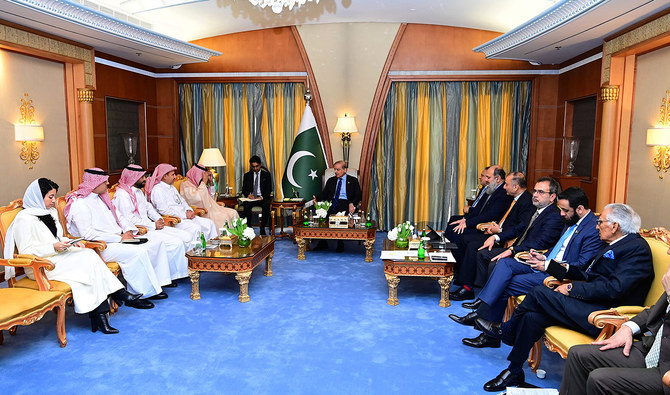
- PM Shehbaz Sharif is in Riyadh to attend WEF meeting on global collaboration, growth and energy
- On Sunday, he met with Saudi Arabia’s minister of finance, investment, and industry and minerals
ISLAMABAD: Prime Minister Shehbaz Sharif on Sunday met with Saudi Arabia’s ministers of finance, investment and industry in Riyadh on the sidelines of a World Economic Forum (WEF) meeting, Sharif’s office said, adding that the Saudi ministers assured him of the Kingdom’s support for Pakistan’s development.
The Pakistan prime minister arrived in Riyadh on Saturday to attend the WEF meeting on global collaboration, growth and energy on April 28-29, after being extended an invitation by Crown Prince Mohammed bin Salman and Professor Klaus Schwab, the WEF executive chairman.
On the sidelines of the WEF meeting, Sharif held separate meetings with Saudi Arabia’s Finance Minister Mohammed Al-Jadaan, Investment Minister Khalid Al-Falih, and Industry and Mineral Resources Minister Bandar Alkhorayef, according to the Pakistan PM’s office.
In his meeting with the Saudi finance minister, the two sides agreed that Saudi Arabia would explore more opportunities for investment in Pakistan.
“The Saudi finance minister reiterated Saudi Arabia’s support for Pakistan’s economic development,” Sharif’s office said in a statement.
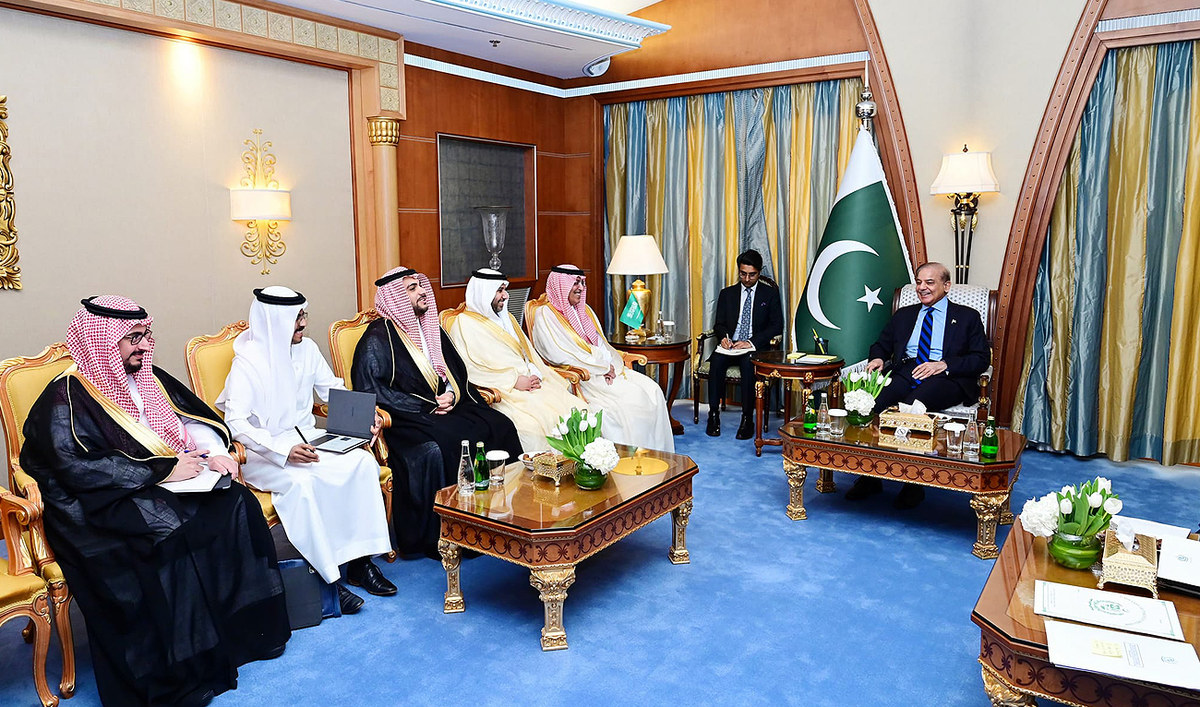
The Saudi investment minister acknowledged PM Sharif’s efforts for Pakistan’s growth and prosperity.
“A delegation of Saudi investors will soon visit Pakistan,” he was quoted as saying by Sharif’s office.
“Pakistan is our priority in terms of investment. Both sides will continue to fully cooperate in agriculture, information technology (IT) and energy sector.”
Pakistan and Saudi Arabia enjoy strong trade, defense and cultural ties. The Kingdom is home to over 2.7 million Pakistani expatriates and serves as the top source of remittances to the cash-strapped South Asian country.
Both Pakistan and Saudi Arabia have been closely working to increase their bilateral trade and investment, and the Kingdom recently reaffirmed its commitment to expedite an investment package worth $5 billion discussed previously with Islamabad.
In his meeting with the prime minister, Saudi Arabia’s Industry and Mineral Resources Minister Bandar Alkhorayef expressed “deep interest” in cooperation with Pakistan in agriculture, minerals, IT and other sectors, according to Sharif’s office.
“I am in touch with Saudi private companies regarding investment in Pakistan and [representatives of] these companies will visit Pakistan very soon,” the Saudi minister was quoted as telling PM Sharif.
“Cooperation between private sectors of the two countries is among our top priorities.”
PM Sharif thanked Saudi Arabia’s King Salman and Crown Prince Mohammed bin Salman as well as the Saudi ministers for supporting Pakistan in every difficulty.
“During my previous government, our economic situation improved, thanks to Saudi Arabia’s support and assistance,” he said, describing both countries as strategic partners.
Pakistan’s Foreign Minister Ishaq Dar, Finance Minister Muhammad Aurangzeb and other members of PM Sharif’s cabinet were also present at the meetings.
Foreign Minister Ishaq Dar appointed deputy prime minister of Pakistan
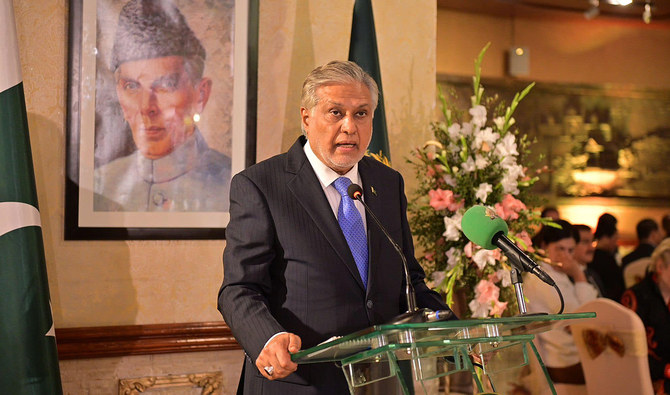
- Dar, a chartered accountant and a seasoned politician, is considered closest ally of Nawaz Sharif, PM Shehbaz Sharif’s elder brother and three-time former PM
- Many believe Dar’s appointment indicates that Nawaz, who didn’t take PM’s office due to split mandate in Feb.8 vote, is trying to assert his control indirectly
ISLAMABAD: Pakistan Prime Minister Shehbaz Sharif has appointed Foreign Minister Ishaq Dar deputy prime minister of the country, the Pakistani government said on Sunday.
Dar, who is a former four-time finance minister of Pakistan, was earlier made the head of a special committee of PM Sharif’s cabinet on privatization.
The 73-year-old chartered accountant is considered to be the closest ally of PM Sharif’s elder brother, Nawaz Sharif, who is also a three-time former prime minister.
“The prime minister has been pleased to designate Mr.Mohammad Ishaq Dar, Federal Minister for Foreign Affairs, as Deputy Prime Minister with immediate effect and until further orders,” read a notification issued from the Cabinet Division.
Nawaz, who returned to Pakistan in October 2023 after having spent years in self-exile, was seen as the favorite candidate for the PM’s office ahead of the Feb. 8 national election and was widely believed to be backed by the country’s powerful army.
But the three-time former prime minister decided not to take the PM’s office after the Feb. 8 vote did not present a clear winner, leading to speculation that his role in the country’s politics had come to an end.
But many believe Dar’s appointment to the deputy prime minister’s slot is an indication that Nawaz is trying to assert his control of government through indirect ways.
Prior to Dar, Chaudhry Pervaiz Elahi was appointed the deputy prime minister of Pakistan in 2012.










